Displaying ads is an excellent way to monetize your blog, and using an ad network helps you avoid having to negotiate directly with advertisers.
While Google AdSense is the most popular ad network among websites, there are other alternatives. In this post, we’ll walk you through the best ad networks for bloggers, their features, requirements, pros, and cons.
- Monetizing a blog with ads is one of the most popular ways of earning an income from your blog
- Ad networks save you the time and effort of having to find advertisers by yourself by using programmatic advertising technology to automate the transaction of ad spaces
- Choosing the right ad network for your blog will depend on factors such as their niche, and their vertical, among others
- Read on to learn the top 15 ad networks for bloggers and tips to choose the best for your blog
Media.net
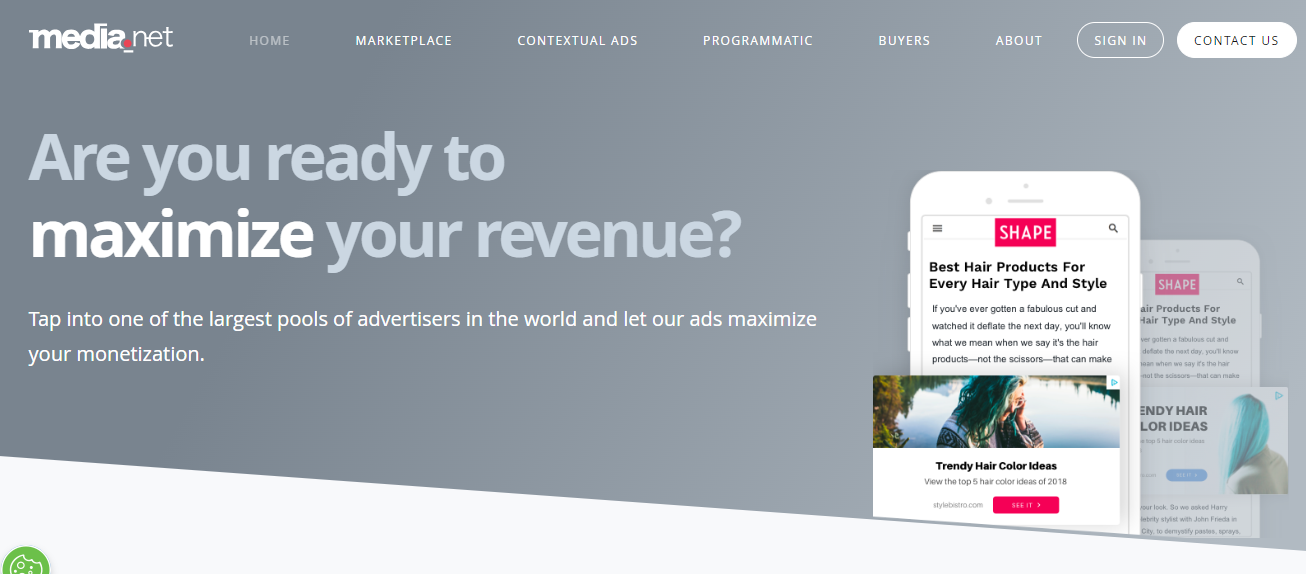
Media.net is a contextual advertising network that specializes in matching the ads to your website context.
Key Features
- High-quality ads
- Customizable ad units
- Premium Advertisers
- Responsive design
Pros of Media.net
- Excellent ad design
- A personal account rep optimizes ads for ROI, and conducts A/B testing on publisher ads, excluding layout
- Best suited for specific niches, especially product-heavy ones
- Compatible with AdSense
- Supports mobile ads
Cons of Media.net
- If your traffic is low, you may not get approved
- No page-level reporting. The platform doesn’t offer any data at the page level
- No self-split-testing
Minimum Payout
$100
Traffic Requirements
No minimum traffic requirements.
Payment Model
CP, CPC, CPM, CPL
Ezoic
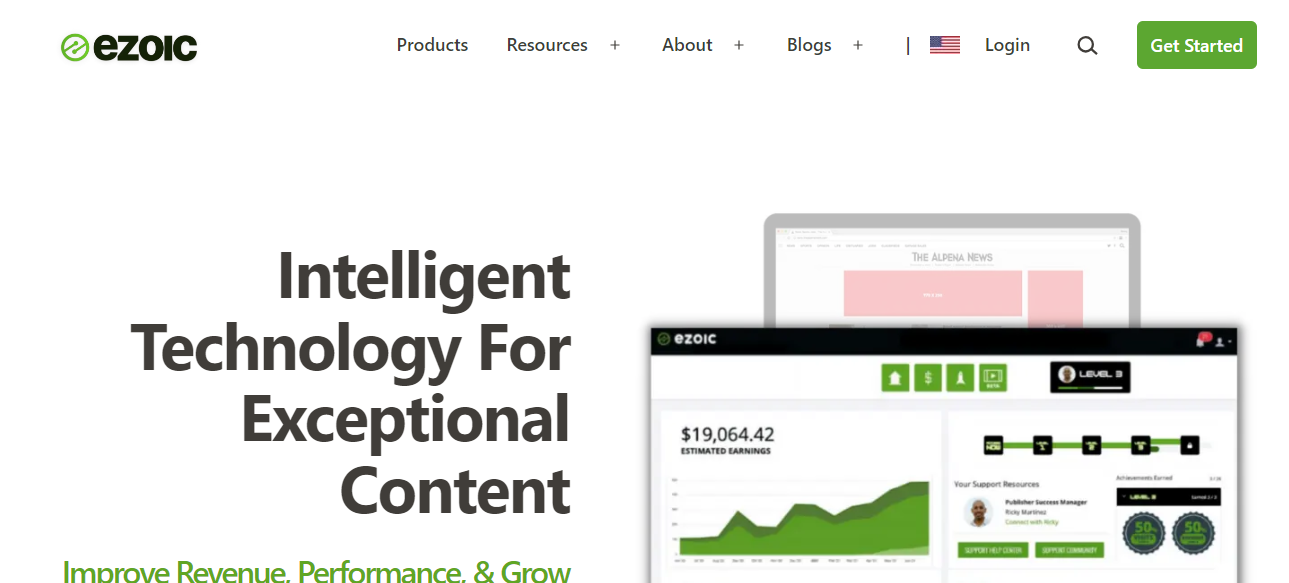
Ezoic is an ad network that uses advanced technology to optimize ad placement for display, video, and native ads.
Key Features
- Artificial intelligence and machine learning
- Programmatic ads
- Integrates with multiple ad networks
Pros of Ezoic
- Advanced ad testing through A/B testing for positions and various ad sizes, using machine learning
- Allows sticky ads, an advantage over Google AdSense
- Publishers have full control over ads
- Comprehensive reporting and analytics, including per-page details
Cons of Ezoic
- Difficult-to-use interface
- The setup is confusing
- Results take a month to materialize
- Watermark on the free tier; removing the ad requires a 5% cut to Ezoic
Minimum Payout
$20
Traffic Requirements
Minimum 10,000 sessions per month.
Payment Model
CPM
Outbrain
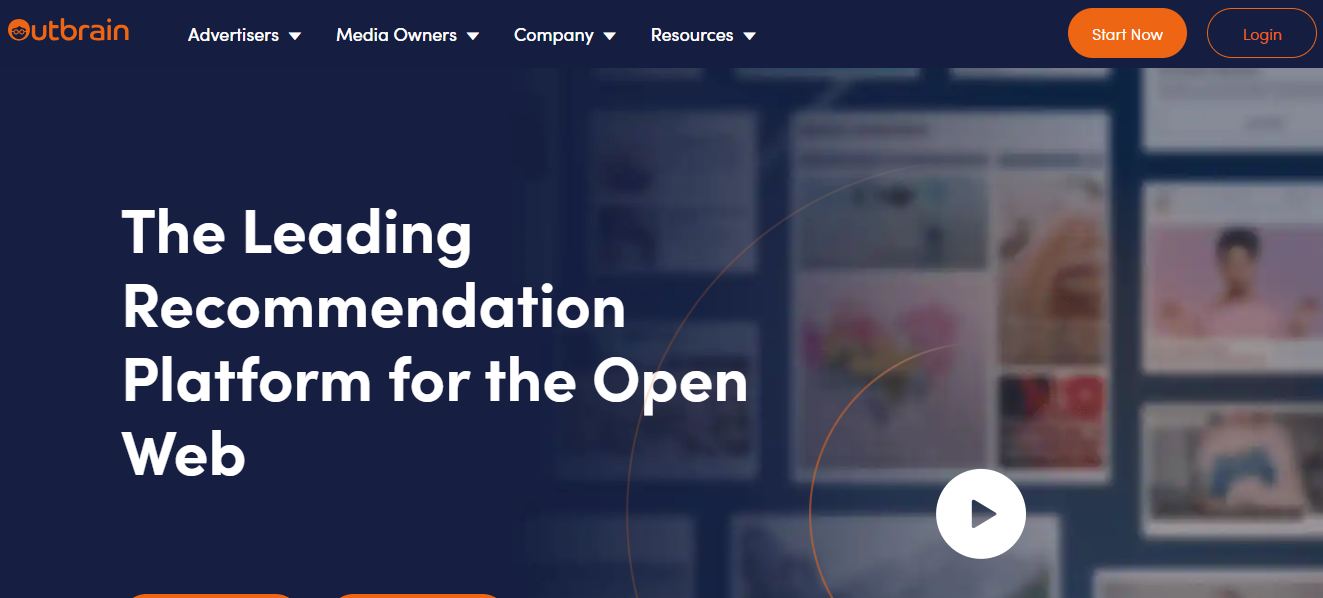
Outbrain is a native advertising platform that works as a recommendation platform. It curates and presents recommendation feeds on your website. It offers audience segmentation, behavioral targeting, advanced reporting, and analytics.
Key Features
- AB Testing
- API
- Account Alerts
- Behavioral targeting
- Campaign Analytics
- Mobile retargeting
Pros of Outbrain
- Unique monetization
- Diverse targeting: Customizable ads for specific audiences or demographics
- User-friendly interface
- Augmented Exposure and extensive site network
- High-Quality Traffic
- Compatibility with Google Adsense: Seamless integration for optimized revenue
Cons of Outbrain
- Publishers might experience delays in real-time performance monitoring
- Limits ad formats to native options
Minimum Payout
$50
Traffic Requirements
10 million monthly US article pageviews.
Payment Model
CPC
Monumetric
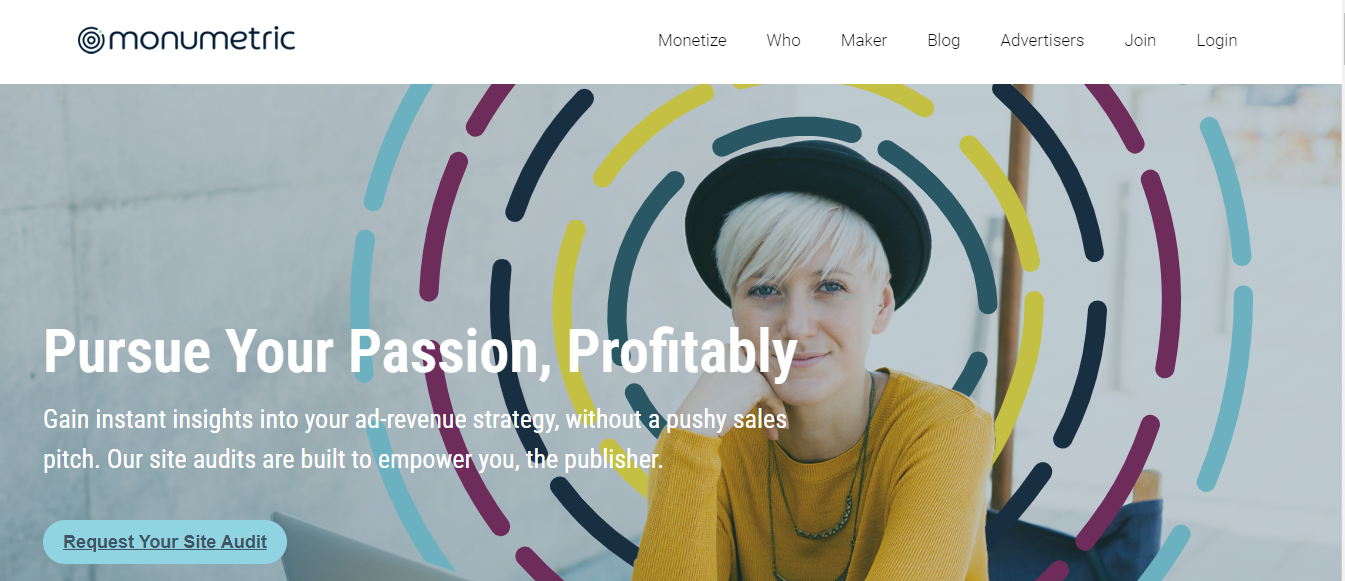
Monumetric started as a network focused on bloggers which evolved into a comprehensive ad network.
Key Features
- Private ad marketplace that works with a variety of networks
- Header bidding
- Dynamic mobile ads
- Pre-bid of video ads
Pros of Monumetric
- The network representatives help you with strategies for your blog, optimize ads, and support issues
- The system automatically places the ads and optimizes them for display
- Wide range of ad units
Cons of Monumetric
- You need at least 10,000 page views a month.
- You have to pay a one-time setup fee of $99.
- It takes about a month to get approved and get the ads showing on your blog.
- Monumetric offers payments on net+60 terms, which means you get your payments for two more months.
Minimum Payout
There is no minimum payout threshold.
Traffic Requirements
Monumetric only requires 10,000 page views per month to be accepted into their program. This low requirement makes Monumetric suitable for new bloggers. It requires a WordPress or Blogger Site, a minimum of six ad slots on the website or mobile, and a one-time setup fee of $99.
Payment Model
CPM
Infolinks

Infolinks is a global advertising platform geared toward publishers. It offers contextual ads that help to avoid banner blindness. Infolinks receives all sizes of publishers. Integrates with AdSense. It offers several ad formats, such as inFold, inFrame, inArticle, and inText.
Key Features
- Multiple ad formats
- Seamless integration with AdSense to boost revenue opportunities.
- Customizable ads
Pros of Infolinks
- No hidden or setup fees. Utilizes your website niche to display relevant ads for your target audience.
- Approval within 48 hours, with no minimum traffic requirement, enabling a quick start for small publishers
Cons of Infolinks
- Some ads are intrusive: Contextual ads, particularly the InFold sticky format, can be intrusive as it doesn’t scroll.
- Low revenue for non-tier 1 traffic: While Infolinks accepts websites from all tiers, publishers from developing countries may earn less than tier 1 counterparts.
Minimum Payout
$50
Traffic Requirements
There are no minimum traffic requirements.
Payment Model
Combines CPM and CPC.
Taboola
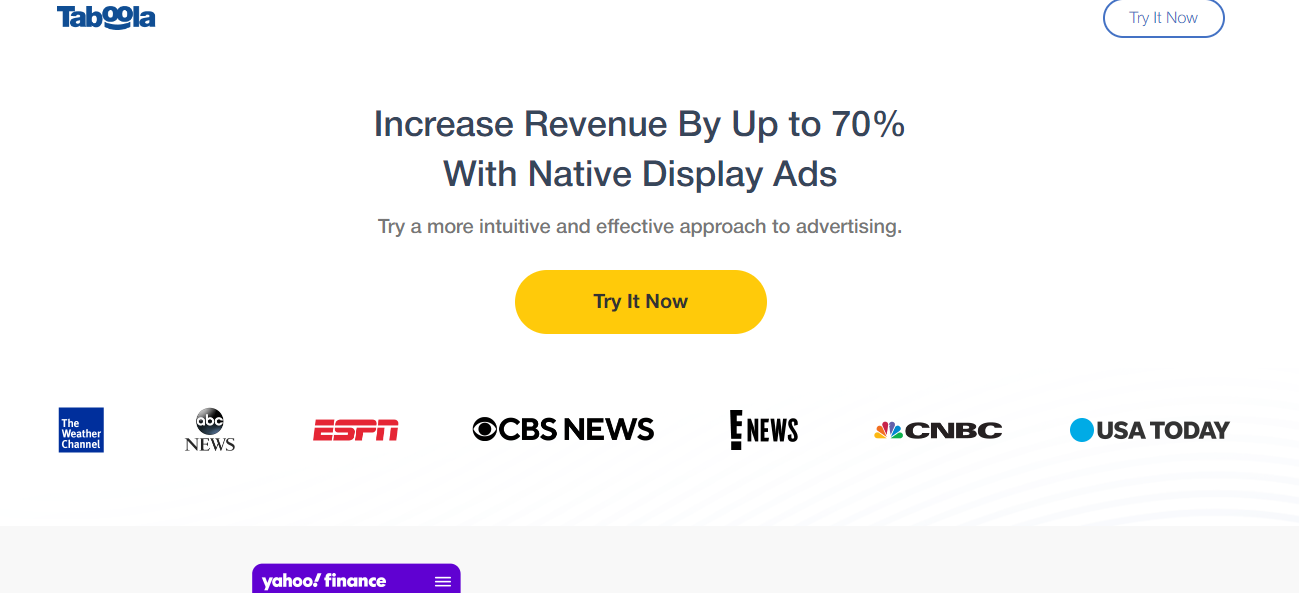
Taboola is a digital advertising platform known for its content discovery and native advertising services. It helps online publishers monetize their websites and allows advertisers to distribute sponsored content to a wide audience.
Key Features
- Ad creation
- Ad optimization
- Native ads
- Large publishers pool.
- 24/7 customer support
Taboola Pros
- Variety of ad formats, including Native Ads, Video Ads, Sponsored Content, and Display Ads
- Large audience reach, with over 1 billion monthly active users
- Audience targeting, segmentation, and retargeting
- Traffic and conversion tracking for publishers
- Comprehensive reporting and analytics
Taboola Cons
- No free trial for users
- The interface is not user-friendly; users find the UI disorganized and confusing
- Limited payment methods; Taboola pays publishers only through a dedicated Payoneer account
Minimum Payout
$50
Traffic Requirements
Taboola requires publishers to have a minimum of 500,000 monthly page views.
Payment Model
CPC and CPM
Mediavine
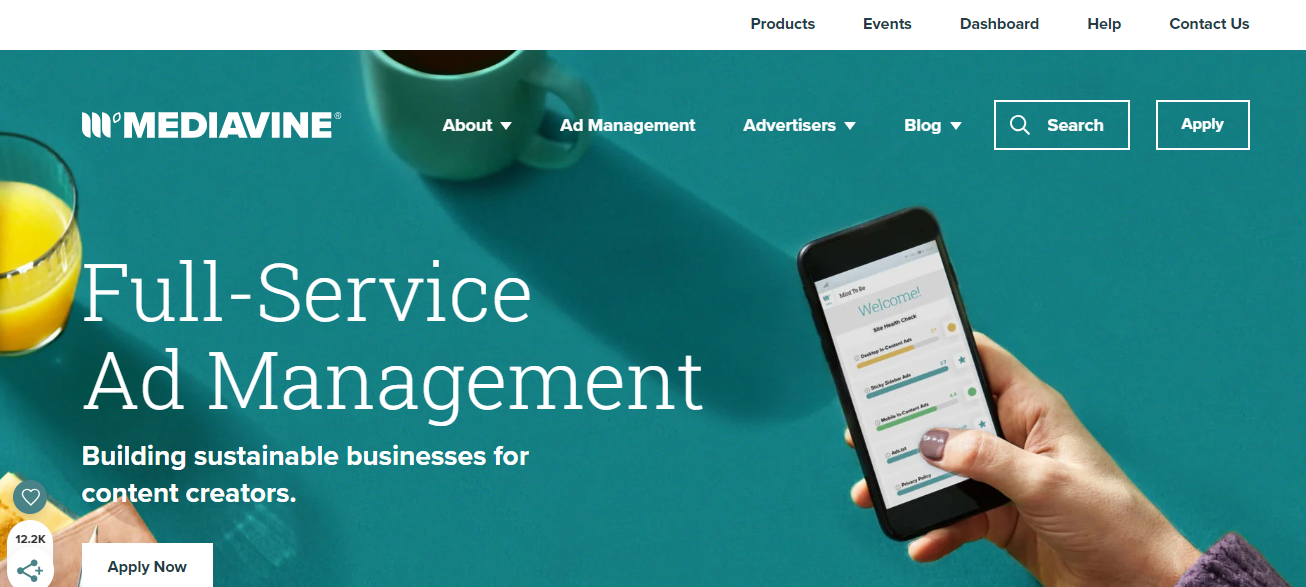
Mediavine is an ad management platform, associated with Google, geared for publishers. It connects directly with ad exchanges to monetize ad space.
Key Features
- Tailored suggestions based on the ad’s potential revenue
- Custom Ad Layouts
- Header Bidding
- Lazy Loading
Pros of Mediavine
- High earnings for tier 1
- High ad quality
- Complete visibility into earnings, CPM, ad performance, and optimization strategies
Cons of Mediavine
- Does not show page performance
- Watermark at the bottom of each ad
- Limited ad units
Minimum Payout
$200
Traffic Requirements
50,000 monthly sessions.
Payment Model
CPM
BuySellAds
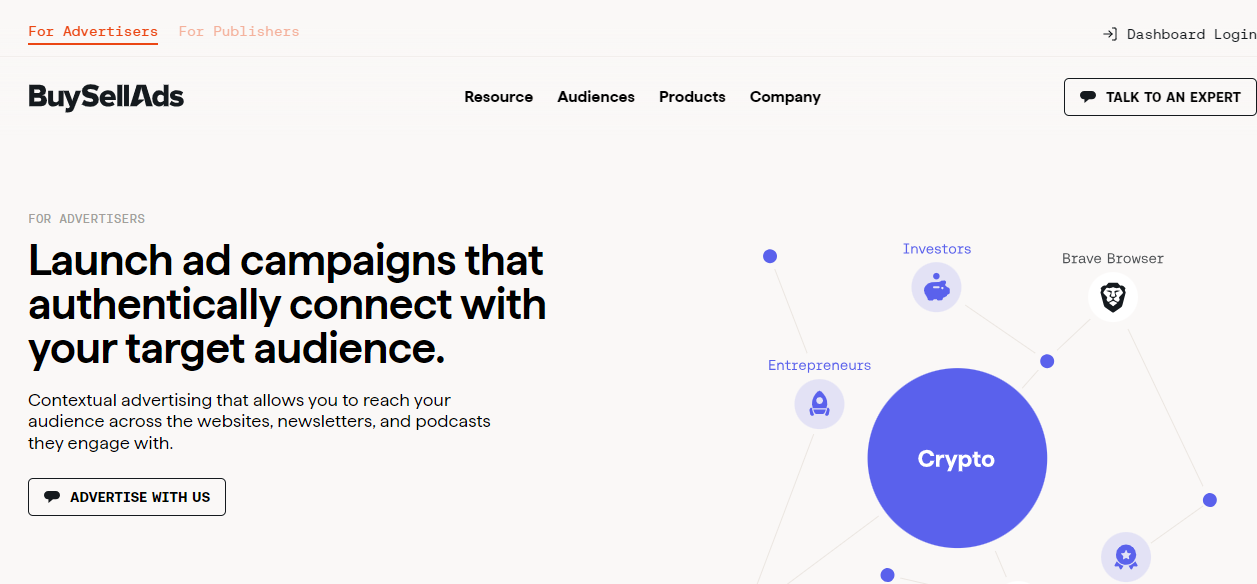
BuySellAds is an ad marketplace connecting publishers and advertisers. The network focuses on the tech, web design, and development niche. With BuySellAds, publishers list their available inventory and receive placement requests from advertisers.
Key Features
- Customizable ads
- No starter fee
- Several payment methods
- Focused on tech and web design
- Publishers can reject advertisers
Pros of BuySellAds
- Automated ad displaying: All ads are automatically approved, with BuySellAds handling the workload.
- A large pool of advertisers: Ideal for new blogs due to the extensive advertiser base.
- Publisher control: Provides total control over the type and amount of advertising space offered.
Cons of BuySellAds
- Cost: Takes a 25% cut of your earnings.
- Cluttered directory: Advertisers may find it challenging to locate their blogs in the directory.
Minimum Payout
$20 for PayPal, and $50 for other payment methods.
Traffic Requirements
No traffic minimum requirement
Payment Model
CPM
Adversal
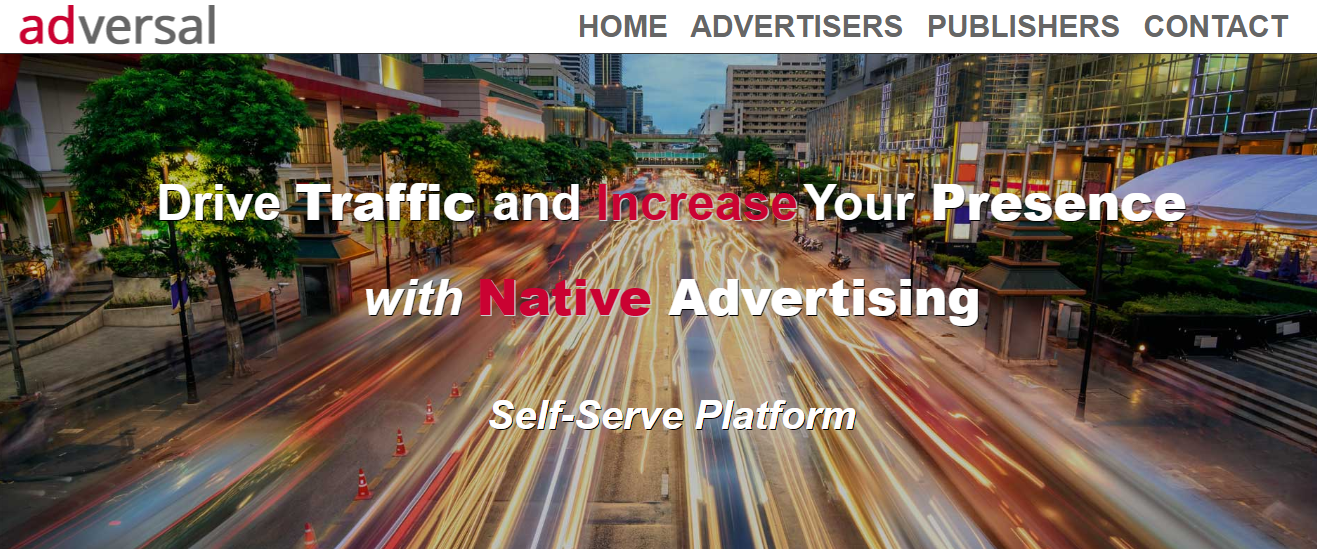
Adversal is an advertising network for banner and pop-under ads. The publisher’s requirements are minimal and the payout threshold is also low. Their system is easy to use and it also offers tracking and analytics.
Key Features
- Multiple advertising formats
- Pays on a page impression basis
- 100% fill rate
Pros of Adversal
- Pays high CPM rates for every tier
- High-quality banner ads with a 100% fill rate
Cons of Adversal
- Requires at least 50,000 page views
- Operates on a Net35 system
Minimum Payout
$20
Traffic Requirements
50,000 page views.
Payment Model
CPM
Google AdSense
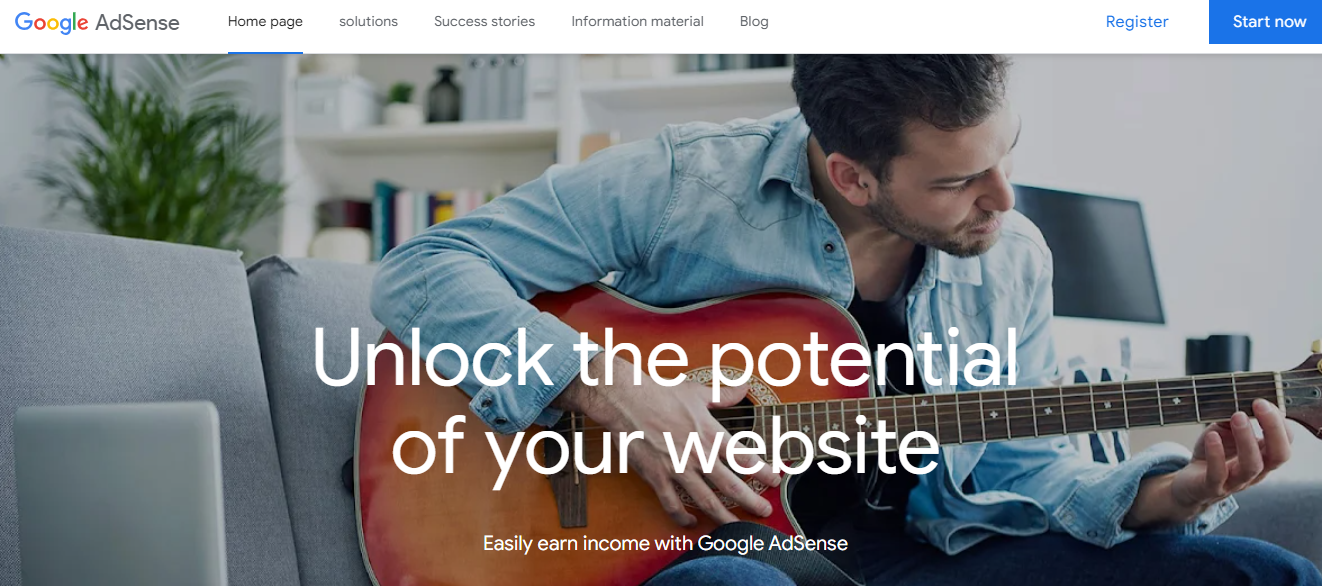
Google AdSense is the most popular ad monetization platform worldwide. Its massive reach promises a lot of potential conversions when you add Google ads to your site. It is simple to start and use and enables you to optimize your strategy with Google Analytics.
Key Features
- Native Ad Serving
- Real-time data analytics
- Real-time monitoring
- A/B testing
- Machine learning
Pros of Google AdSense
- Registration with Google AdSense is cost-free if you have a Google account.
- Can place ads on multiple sites with a single account
- Easy to customize ads
Cons of Google AdSense
- $100 minimum payout
- While technically possible to run multiple ad networks alongside Google AdSense, it is restricted to networks complying with Google guidelines
Minimum Payout
$100
Traffic Requirements
No minimum traffic requirement.
Payment Model
CPC
Amazon Associates

The Amazon Associate program allows website owners, content creators, and social media influencers a way to monetize their traffic. Unlike other ad networks, Amazon Associates uses link building to earn money through sales on Amazon. The platform also provides server-to-server header bidding integration for publishers.
Key features
- Working with the world’s largest retailer
- Easy linking features
- Reporting tools
- Centralized dashboard
Pros of Amazon Associates:
- Unified ad marketplace: Offers header bidding from both Amazon and third-party partners.
- Responsive ads for both mobile and desktop.
- High commissions: up to 20% affiliate commission on a product.
Cons of Amazon Associates
- Site review and three sales within the first 6 months are prerequisites for approval
- Requires investment in tracking traffic and ad performance
Minimum Payout
$100
Traffic Requirements
No traffic requirements.
Payment Model
Pay per sale.
Raptive (formerly AdThrive)
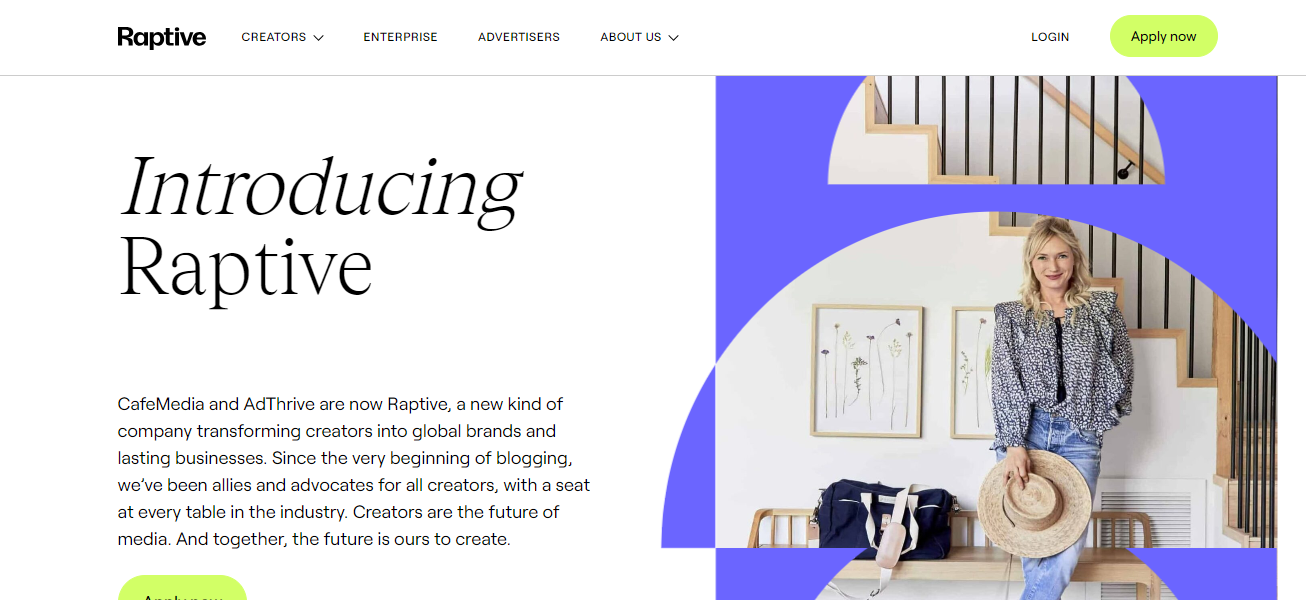
Raptive is an ad network focused on bloggers and content creators. This premium ad management network offers publishers access to high-paying advertisers.
Key Features
- Proprietary ad formats
- Customizable A/B testing
- SEO support
- Site performance and monitoring
Raptive Pros
- High revenue share: Raptive publishers earn more in all tiers compared to other networks.
- Dedicated account manager: Assists in optimizing ad campaigns and recommends premium ad campaigns.
Raptive Cons
- Requires a minimum of 100,000 page views per month
- Restricts the pool of publishers it works with, posing difficulty for new publishers to enter
Minimum Payout
$25
Traffic Requirements
100,000 a month.
Payment Model
RPM
Revcontent
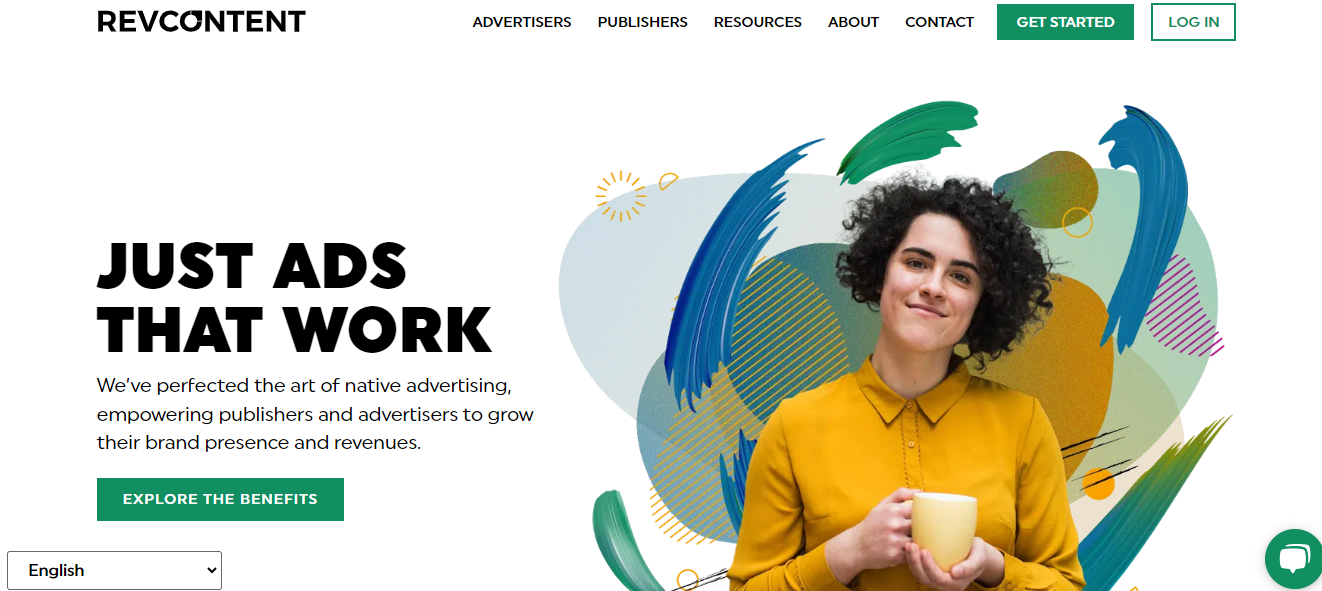
Revcontent is a content recommendation platform that provides publishers with ad solutions such as API customizations, ad rotation, and more.
Key Features
- Live click map that shows the last 500 clicks on a world map
- Performance graph and insights
- Native ads
- Customizable features
Pros of Revcontent
- First-party demand
- Revcontent guarantees a 20% revenue increase
- Mobile monetization platform
- Full control for publishers
Cons of Revcontent
- Requires a minimum of 50,000 unique visitors per month.
Minimum Payout
$100
Traffic Requirements
50,000 visitors per month.
Payment Model
CPM, CPC
Sovrn // Commerce (Formerly VigLink)
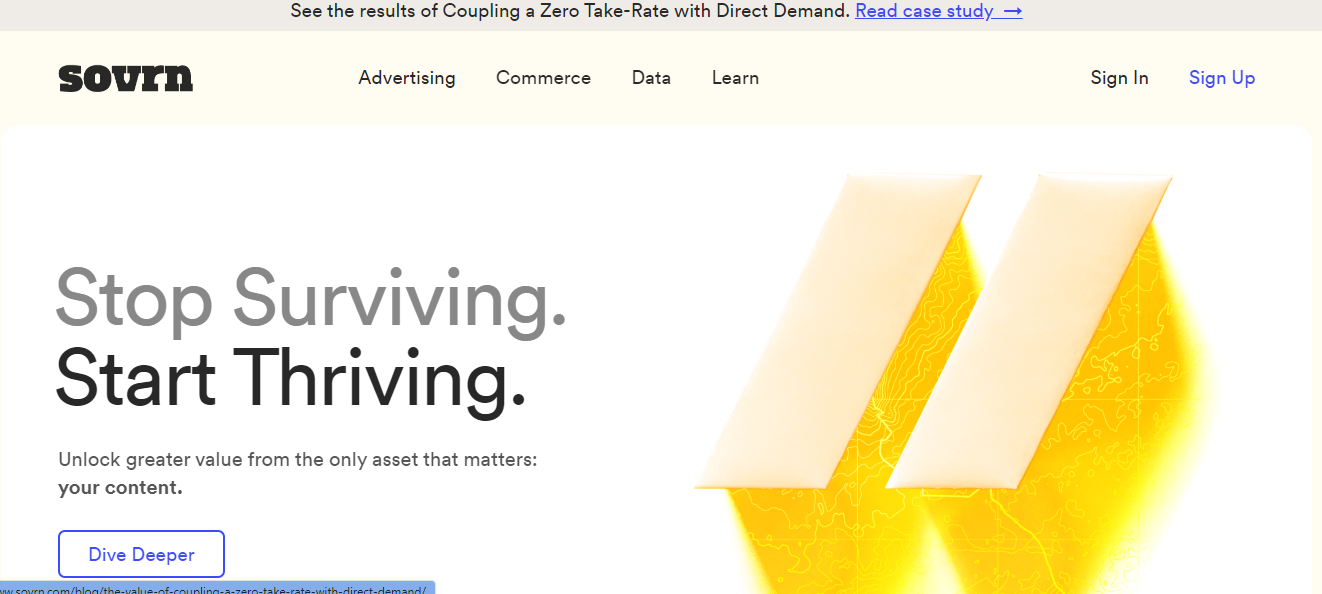
Sovrn is an ad tech and data monetization company offering services for publishers to maximize gains from their ad inventories. They offer header bidding, data, and email monetization, allowing publishers to create ad units, and track performance, and audience behavior.
Key Features
- Ad exchange
- Ad management
- Affiliate links
- Price comparisons
- Data monetization
Pros of Sovrn
- Low minimum payment threshold: Payment is received upon reaching $25.
- Header bidding: Available both client-side and server-side, with a dedicated account manager managing publisher demands
- Customization: Offers multiple ad formats and A/B testing options
Cons of Sovrn
- Sovrn is an invite-only network, requiring website approval that can take weeks
- Low eCPM for non-Tier 1 traffic
- Only supports CPM
Minimum Payout
$25
Traffic Requirements
No minimum traffic is required.
Payment Model
CPM
PropellerAds
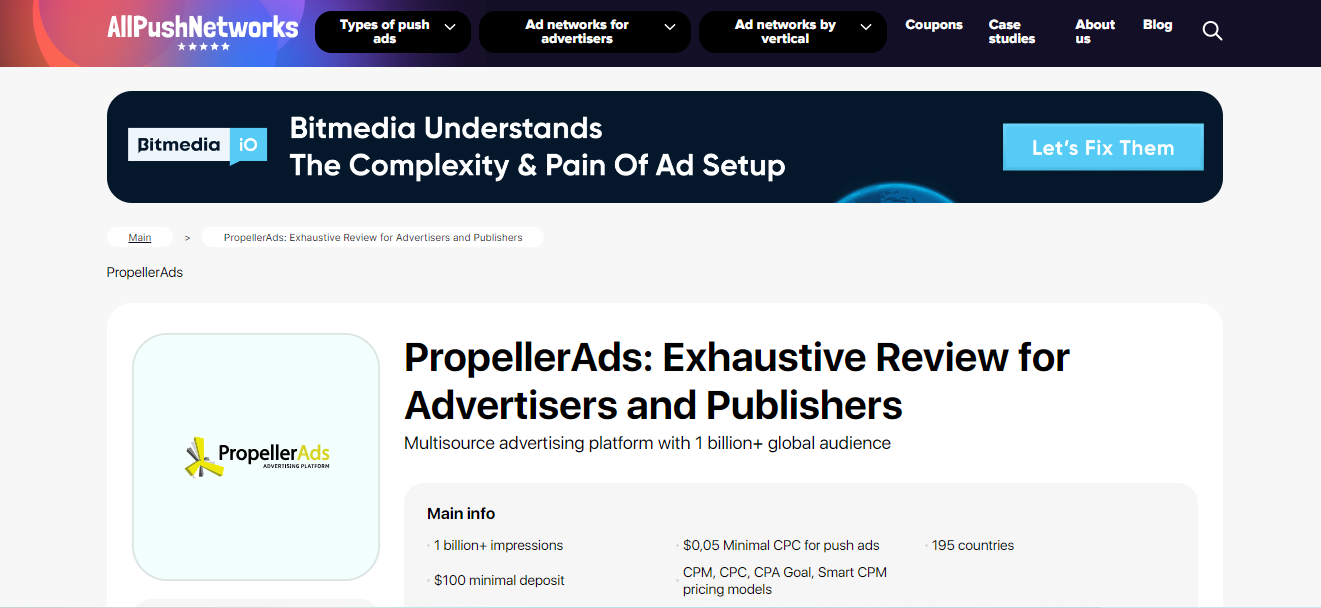
PropellerAds is an ad monetization platform that offers display, native, video, and popunder ads. PropellerAds claims to use proprietary algorithms that enable them to offer the best rates in the market.
Key Features
Global coverage
- HAs a community of active publishers
- High performing ad types
Pros of PropellerAds
- AdSense compatible
- Adblock bypass
- OnClick PopUnder Ads
- No minimum traffic requirement
Cons of PropellerAds
- Lower revenue for non-English sites
- CPM tied to website quality
- No header bidding
Minimum Payout
$5
Traffic Requirements
No minimum traffic requirements
Payment Model
CPM, CPC, CPL, CPI, CPA
What to Look for In an Ad Network
When selecting an ad network several factors contribute to the overall success of a publisher’s monetization strategy:
- Relevancy and Quality of Ads—Choose a network that provides ads relevant to your audience and maintains high quality, as this ensures better engagement and higher click-through rates.
- Revenue Sharing and Payout Terms—Understand the network’s revenue share model, minimum payout thresholds, and payment frequency to ensure it aligns with your financial expectations.
- User Experience Impact—Consider how ads will affect your site’s user experience. Ads should not be overly intrusive or significantly slow down your site, as this can negatively impact audience retention and SEO.
- Reporting and Analytics—Opt for a network offering comprehensive analytics and reporting tools, enabling you to track ad performance and optimize your strategy.
- Ease of Integration and Customization Options—The network should offer straightforward integration with your website and provide customization options to ensure ads align with your site’s design and layout.
Types of Ad Networks: Affiliate and Other Ad Networks to Consider
In the digital advertising landscape, you can find different ad networks connecting advertisers with their target audiences. Let’s explore the different types and who they are best for.
Performance Ad Networks or Affiliate Ad Networks
Affiliate ad networks are platforms that act as intermediaries between advertisers (merchants) and publishers (affiliates). They provide a framework for managing and promoting affiliate marketing programs.
Affiliate ad networks act as enable brands to find suitable affiliates for product promotion and affiliates to discover programs aligning with their interests.
Examples include ClickBank, CJ Affiliate, ShareASale.
Vertical Ad Networks
Vertical ad networks are specialized advertising platforms that focus on specific industry sectors or niche markets.
They differ from general ad networks in that they cater to a particular vertical (or category) and tailor their services to the unique needs and characteristics of that sector.
Vertical ad networks are particularly beneficial for businesses looking to reach a specific audience with a high degree of relevance.
Examples include Healthline Media, AutoTrader, Raptive
Inventory-Specific Ad Networks
Inventory-specific ad networks are advertising platforms that specialize in particular types of ad inventory or specific formats of advertising.
Unlike general ad networks that cover a wide range of ad types and formats, inventory-specific networks focus on a certain kind of advertising space or medium, catering to specific marketing needs and preferences.
They often provide advanced targeting and tracking capabilities suitable for their specific type of inventory.
Examples include: Taboola, Outbrain, Google Display Network (GDN)
Premium Ad Networks
Premium ad networks are advertising platforms that offer high-quality ad inventory from reputable publishers to advertisers. These networks differentiate themselves by focusing on premium, often exclusive, ad spaces on well-known and highly trafficked websites.
Examples include: Condé Nast Media Network, Forbes Media, The Wall Street Journal Digital Network
Final Word: Which Ad Network Is Best for Blogging?
Bloggers and small publishers should use all the monetization tools suitable to ensure their digital properties produce revenue. Joining an ad network can be an excellent source of income if you do things right.
In this post, we brought you the best ad networks for bloggers. So, which one should you choose? This decision will depend on your target audience’s needs and your marketing strategy. Before choosing the ad network, consider the types of ads that engage your target audience and enhance your content.
Next Steps: What Now?
- Explore the highest-paying ad networks for publishers







